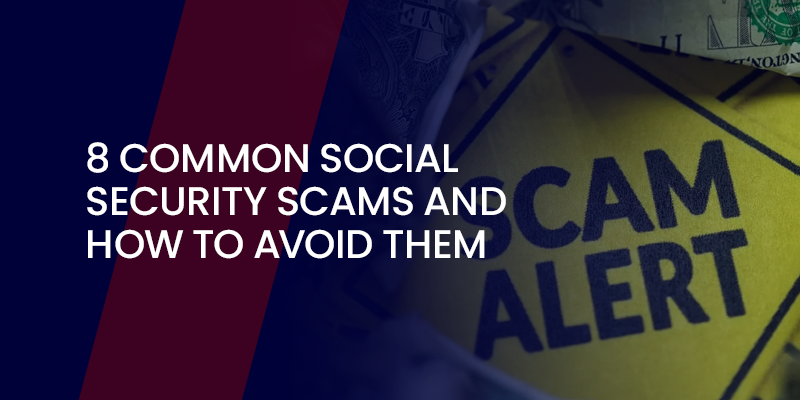Social security scams keep popping up everywhere, hitting users hard, especially older people who count on those benefits. Scammers fake calls from the Social Security Administration, or SSA, to steal money or personal details. You’ve probably heard about social security scam calls that promise refunds but end up emptying your wallet. Or maybe letters in the mail that look official but aren’t. Questions like “Does Social Security call you?” come up a lot, and the short answer is usually no, not out of the blue.
These tricks have cost people billions over the years. Phone scams top the list, with crooks using fake numbers to seem real. They create panic, saying your benefits will stop unless you act fast. Emails and texts join in, too, with links that lead to trouble. Let’s look at eight big ones. I’ll explain how they work, signs to spot them, and ways to stay safe. Knowing this stuff helps you dodge the traps.
Fraudsters are dynamic, and therefore, being vigilant is important. According to reports, the number of victims has increased every year, mostly due to unavoidable oversights, such as providing a Social Security number even during a phone call.
8 Social Security Scams and How to Be Safe
1. Calls That Threaten to Cut Off Your Benefits
Suppose your phone rings, and someone says they’re from the SSA. They claim your Social Security number got linked to a crime, and your benefits will vanish unless you fix it right away. These social security scam calls push you to give up details or pay up fast, maybe with gift cards or wire transfers.
How do they pull it off? They fake the caller ID to match real government numbers. Then they scare you with talk of arrests or frozen accounts. But the SSA doesn’t work that way. They won’t call demanding money or info on the spot.
To stay clear:
- Hang up without a second thought if it’s unexpected.
- Call the SSA back using their official number, 1-800-772-1213, from their website.
- Turn on features to block unknown callers.
- Tell the SSA’s Inspector General about it at oig.ssa.gov.
Reports peg losses from this at huge amounts, mostly hurting seniors living alone. Stay cool, and you’ll be fine.
2. Emails That Fish for Your Info
You get an email that looks like it’s from the SSA. It says update your details or lose out on benefits. Click the link, and you’re on a fake site stealing your data. Some promise bigger checks if you verify first.
These emails use urgent words like “act now.” Real SSA messages don’t ask for sensitive stuff or include risky links. Watch for bad spelling or weird web addresses. In recent times, these have spiked for people starting retirement claims.
Tips to skip the trap:
- Check links by hovering your mouse; they should go to ssa.gov.
- Trash the email and report it as junk.
- Run an antivirus that spots phishing.
- Log in only on the real mySocialSecurity site.
- Alert the FTC at ftc.gov/complaint.
3. Texts Offering Refunds or Wins
A text pops up saying you qualify for a Social Security refund or prize. It has a link or tells you to call back. Click, and malware hits your phone, or you pay fees that aren’t real.
Scammers blast these to tons of numbers, betting some will respond. They add pressure with deadlines. But the SSA hardly ever texts, and never with links or info requests.
Ways to block them:
- Ignore and delete unknown texts.
- Send them to 7726 to flag spam with your phone company.
- Use your device’s filters.
- If it’s fishy, check straight with the SSA.
Remember, free money offers usually mean trouble.
4. Fake Letters Sent by Mail
You open your mailbox and find a letter on what looks like SSA paper. It talks about changes to your benefits or says you owe money. It might ask for payment or push you to call a number.
These social security scams by mail target people who avoid tech. The papers seem legit, but check closely: Wrong details or odd requests give them away. True SSA letters follow set rules and offer ways to appeal, without quick cash demands.
To handle it:
- Rip up anything suspicious.
- Phone the SSA to double-check.
- Switch to online statements at mySocialSecurity.
- Report to the postal service and OIG.
5. Fakes on Social Media
Crooks set up phony SSA accounts on sites like Facebook or X. They post about benefit news or offer help. Then they message you privately, asking for details or fees.
Social media makes it easy for them to reach crowds. They copy logos to fool you. But official pages have checks, and they don’t start chats.
Stay safe with these steps:
- Confirm the account is real, like with verification marks.
- Don’t reply to direct messages from strangers.
- Flag fakes to the site and SSA.
- Get info only from trusted spots.
6. Bogus Job Offers from the SSA
Ads show up for SSA jobs, like working from home. Apply, and they want your Social Security number or money for supplies.
These hit job boards or inboxes. No legit government job asks for cash up front. Real openings go through usajobs.gov.
Avoid the mess:
- Apply only on the official site.
- Skip anything wanting payment.
- Look up the offer online for warnings.
- Tell the FTC if it’s shady.
7. In-Person Tricks for Cash
After a call, someone shows up claiming to be SSA, ready to take your overpayment in cash or even jewelry.
This builds on phone scams, making it personal. Fake badges help sell the lie. But the SSA doesn’t do house calls for money.
What to do:
- Say no to any meetups.
- Call the cops right away.
- Verify everything through official lines first.
8. Claims of Overpaid Benefits
You hear you’ve gotten too much in benefits and need to pay back, maybe with Bitcoin or cards. They warn of lawsuits if you don’t.
Actual overpayments come in writing, with time to fix or appeal. No odd payment types.
Quick fixes:
- End the contact and check your account online.
- Report to the OIG.
Final Words!
In wrapping up, social security scams like those endless social security scam calls or tricky social security scams by mail won’t stop soon. But if you wonder, “Does Social Security call you without warning, know it’s probably fake. Spot the hurry, the threats, or weird asks.
Share tips with family, and report bad stuff to the OIG or FTC fast. That way, your money stays yours. If a scam hits you, talk about it to warn others. We can fight back together.







